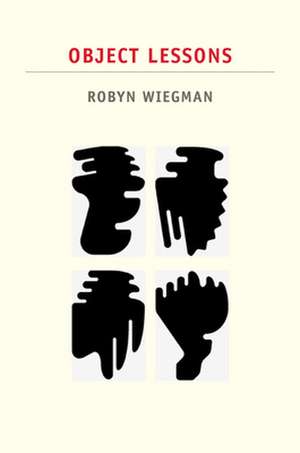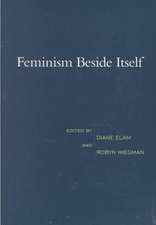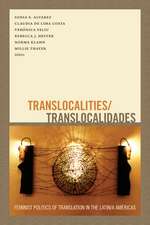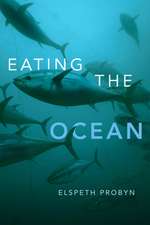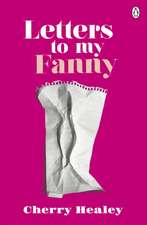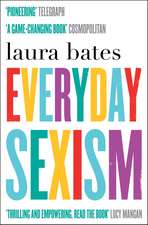Object Lessons: Next Wave: New Directions in Women's Studies
Autor Robyn Wiegmanen Limba Engleză Paperback – 10 ian 2012
Din seria Next Wave: New Directions in Women's Studies
-
 Preț: 166.70 lei
Preț: 166.70 lei -
 Preț: 174.02 lei
Preț: 174.02 lei -
 Preț: 218.88 lei
Preț: 218.88 lei -
 Preț: 251.87 lei
Preț: 251.87 lei -
 Preț: 158.45 lei
Preț: 158.45 lei -
 Preț: 166.70 lei
Preț: 166.70 lei -
 Preț: 209.72 lei
Preț: 209.72 lei -
 Preț: 302.19 lei
Preț: 302.19 lei -
 Preț: 260.41 lei
Preț: 260.41 lei -
 Preț: 300.24 lei
Preț: 300.24 lei -
 Preț: 212.10 lei
Preț: 212.10 lei -
 Preț: 202.80 lei
Preț: 202.80 lei -
 Preț: 301.20 lei
Preț: 301.20 lei -
 Preț: 306.00 lei
Preț: 306.00 lei -
 Preț: 251.12 lei
Preț: 251.12 lei -
 Preț: 262.70 lei
Preț: 262.70 lei -
 Preț: 309.49 lei
Preț: 309.49 lei -
 Preț: 265.79 lei
Preț: 265.79 lei -
 Preț: 237.47 lei
Preț: 237.47 lei -
 Preț: 263.29 lei
Preț: 263.29 lei -
 Preț: 261.38 lei
Preț: 261.38 lei -
 Preț: 263.29 lei
Preț: 263.29 lei -
 Preț: 262.52 lei
Preț: 262.52 lei -
 Preț: 301.20 lei
Preț: 301.20 lei -
 Preț: 266.18 lei
Preț: 266.18 lei -
 Preț: 262.32 lei
Preț: 262.32 lei -
 Preț: 263.09 lei
Preț: 263.09 lei -
 Preț: 262.32 lei
Preț: 262.32 lei -
 Preț: 259.42 lei
Preț: 259.42 lei -
 Preț: 219.70 lei
Preț: 219.70 lei -
 Preț: 301.38 lei
Preț: 301.38 lei -
 Preț: 260.19 lei
Preț: 260.19 lei -
 Preț: 196.55 lei
Preț: 196.55 lei -
 Preț: 261.38 lei
Preț: 261.38 lei -
 Preț: 205.09 lei
Preț: 205.09 lei -
 Preț: 211.33 lei
Preț: 211.33 lei - 19%
 Preț: 636.69 lei
Preț: 636.69 lei
Preț: 304.10 lei
Nou
Puncte Express: 456
Preț estimativ în valută:
58.19€ • 60.91$ • 48.43£
58.19€ • 60.91$ • 48.43£
Carte tipărită la comandă
Livrare economică 31 martie-14 aprilie
Preluare comenzi: 021 569.72.76
Specificații
ISBN-13: 9780822351603
ISBN-10: 0822351609
Pagini: 416
Dimensiuni: 167 x 232 x 25 mm
Greutate: 0.57 kg
Ediția:New.
Editura: MD – Duke University Press
Seria Next Wave: New Directions in Women's Studies
ISBN-10: 0822351609
Pagini: 416
Dimensiuni: 167 x 232 x 25 mm
Greutate: 0.57 kg
Ediția:New.
Editura: MD – Duke University Press
Seria Next Wave: New Directions in Women's Studies
Cuprins
Acknowledgments vii Introduction: How to Read This Book 1 1. Doing Justice with Objects: Or, the "Progress" of Gender 36 2. Telling Time: When Feminism and Queer Theory Diverge 91 3. The Political Conscious: Whiteness Studies and the Paradox of Particularity 137 4. Refusing Identification: Americanist Pursuits of Global Noncomplicity 197 5. Critical Kinship: Universal Aspirations and Intersectional Judgments 239 6. The Vertigo of Critique: Rethinking Heteronormativity 301 Bibliography 345 Index 391
Recenzii
[Wiegmans] book left me reeling in the best possible way, precisely because it focuses in on the affective life of our critical impulses. Wiegman peels back the veneer on our investments in a variety of politics feminist, anti-racist, imperialist, queer leaving us to confront why we show up to struggle with our work. This book gave me the gift of recognizing conflict and incommensurability as powerful sites from which to continue to passionately invest in politics.Naomi Greyser, Feminist Studies
This brilliant, commodious book gives us a name for that fast-moving conceptual traffic arrayed across the academic galaxy from the 1970s to the present; as a strategy for naming, Object Lessons brings about identity knowledges as a rethought object of desire and destination, its political commitments pursued to the bone, in the immediacy of its institutional arrangements. The reader will not want to miss Robyn Wiegman in this quite stunning and masterful outcome. Hortense Spillers, Vanderbilt University
This book is as incisive in its articulation of the stakes involved in postCivil Rights academic field formations as it is responsive to the affective investments shaping specific fields' modes of self-governance and self-reinvention. What do we want from identity knowledgesand what do they offer us? In the incongruent spaces opened up by these questions, and against the non-synchronized discourses marked by political obligations, institutional structures, and methodological ambitions, Robyn Wiegman narrates what she calls object lessons with inimitable intensity, agility, and imagination. If visionary thinking about identity studies is an art, she has given us a brilliant master-class performance. Rey Chow, author of Entanglements, or Transmedial Thinking about Capture
"[Wiegman's] book left me reeling in the best possible way, precisely because it focuses in on the affective life of our critical impulses. Wiegman peels back the veneer on our investments in a variety of politics - feminist, anti-racist, imperialist, queer - leaving us to confront why we show up to struggle with our work. This book gave me the gift of recognizing conflict and incommensurability as powerful sites from which to continue to passionately invest in politics." - Naomi Greyser, Feminist Studies "This brilliant, commodious book gives us a name for that fast-moving conceptual traffic arrayed across the academic galaxy from the 1970s to the present; as a strategy for naming, Object Lessons brings about 'identity knowledges' as a rethought object of desire and destination, its political commitments pursued to the bone, in the immediacy of its institutional arrangements. The reader will not want to miss Robyn Wiegman in this quite stunning and masterful outcome." Hortense Spillers, Vanderbilt University "This book is as incisive in its articulation of the stakes involved in post-Civil Rights academic field formations as it is responsive to the affective investments shaping specific fields' modes of self-governance and self-reinvention. What do we want from identity knowledges - and what do they offer us? In the incongruent spaces opened up by these questions, and against the non-synchronized discourses marked by political obligations, institutional structures, and methodological ambitions, Robyn Wiegman narrates what she calls object lessons with inimitable intensity, agility, and imagination. If visionary thinking about identity studies is an art, she has given us a brilliant master-class performance." Rey Chow, author of Entanglements, or Transmedial Thinking about Capture
This brilliant, commodious book gives us a name for that fast-moving conceptual traffic arrayed across the academic galaxy from the 1970s to the present; as a strategy for naming, Object Lessons brings about identity knowledges as a rethought object of desire and destination, its political commitments pursued to the bone, in the immediacy of its institutional arrangements. The reader will not want to miss Robyn Wiegman in this quite stunning and masterful outcome. Hortense Spillers, Vanderbilt University
This book is as incisive in its articulation of the stakes involved in postCivil Rights academic field formations as it is responsive to the affective investments shaping specific fields' modes of self-governance and self-reinvention. What do we want from identity knowledgesand what do they offer us? In the incongruent spaces opened up by these questions, and against the non-synchronized discourses marked by political obligations, institutional structures, and methodological ambitions, Robyn Wiegman narrates what she calls object lessons with inimitable intensity, agility, and imagination. If visionary thinking about identity studies is an art, she has given us a brilliant master-class performance. Rey Chow, author of Entanglements, or Transmedial Thinking about Capture
"[Wiegman's] book left me reeling in the best possible way, precisely because it focuses in on the affective life of our critical impulses. Wiegman peels back the veneer on our investments in a variety of politics - feminist, anti-racist, imperialist, queer - leaving us to confront why we show up to struggle with our work. This book gave me the gift of recognizing conflict and incommensurability as powerful sites from which to continue to passionately invest in politics." - Naomi Greyser, Feminist Studies "This brilliant, commodious book gives us a name for that fast-moving conceptual traffic arrayed across the academic galaxy from the 1970s to the present; as a strategy for naming, Object Lessons brings about 'identity knowledges' as a rethought object of desire and destination, its political commitments pursued to the bone, in the immediacy of its institutional arrangements. The reader will not want to miss Robyn Wiegman in this quite stunning and masterful outcome." Hortense Spillers, Vanderbilt University "This book is as incisive in its articulation of the stakes involved in post-Civil Rights academic field formations as it is responsive to the affective investments shaping specific fields' modes of self-governance and self-reinvention. What do we want from identity knowledges - and what do they offer us? In the incongruent spaces opened up by these questions, and against the non-synchronized discourses marked by political obligations, institutional structures, and methodological ambitions, Robyn Wiegman narrates what she calls object lessons with inimitable intensity, agility, and imagination. If visionary thinking about identity studies is an art, she has given us a brilliant master-class performance." Rey Chow, author of Entanglements, or Transmedial Thinking about Capture
Notă biografică
Descriere
Examining debates in interdisciplinary identity studies, Robyn Wiegman finds the repeated assumption that a better critical theory will produce a better political outcome. She studies debates in Womens Studies, American Studies, Queer Theory and Whiteness studies, especially at points when the key terms changed, as happened when Womens Studies was superseded by Gender Studies. While scholars each time imagined that a new configuration of the field would be more politically effective, instead the field reshapes itself around the new terms in ways that are not as different as hoped. Her metacritical analysis is sympathetic to the political desires she traces, but also clear about the limitations of this means of producing change.
